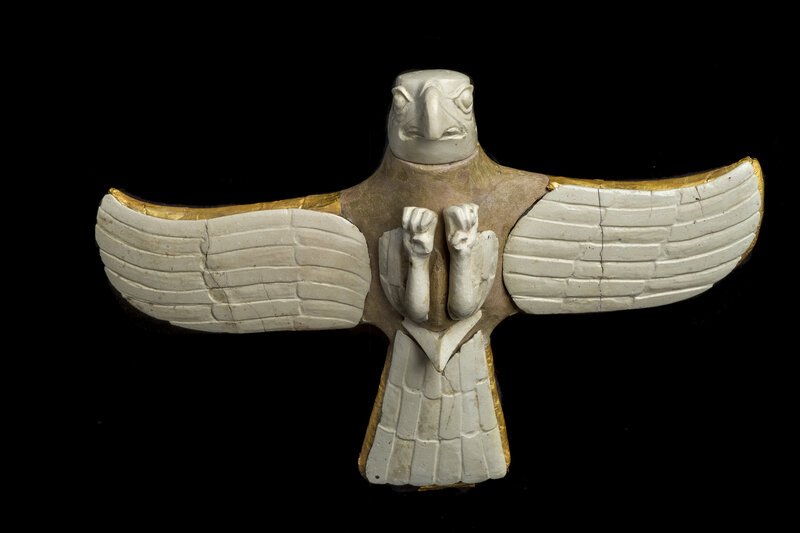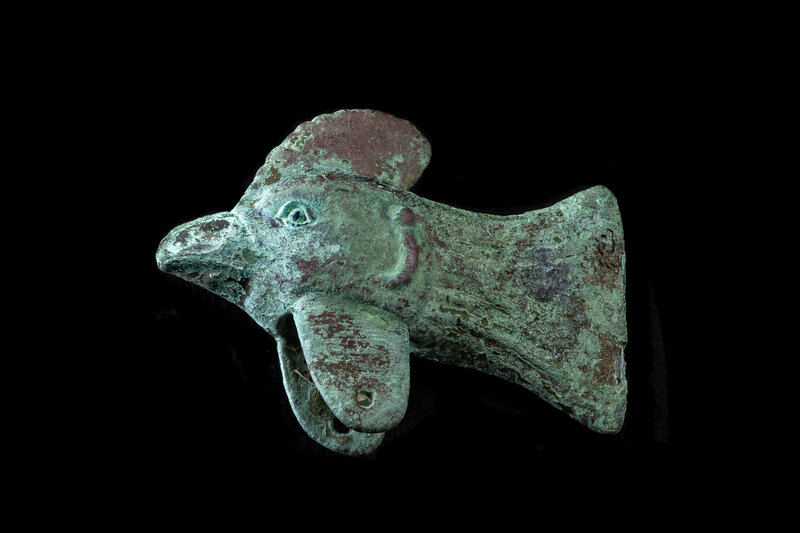'Margiana. A Kingdom of the Bronze Age in Turkmenistan' at Berlin's Neues Museum
Margiana. A Kingdom of the Bronze Age in Turkmenistan. With photographs by Herlinde Koelbl. Exhibition view Neues Museum 2018 © Staatliche Museen zu Berlin, Museum of Pre- and Protohistory / David von Becker
BERLIN.- Margiana – around 4,000 years ago, this historic landscape in eastern Turkmenistan was the cradle of a fascinating and sophisticated Bronze Age culture. Contemporary with the civilisations of Mesopotamia and Egypt, it has nevertheless remained relatively unknown in the West. Now for the first time outside Turkmenistan, a major exhibition at Berlin's Neues Museum makes the archaeological remains of this mysterious culture accessible to a wide public. The distinguished German photographer, Herlinde Koelbl, was asked to photograph the archaeological sites, landscapes, people and exhibits. The result is a fascinating symbiosis of unfamiliar archaeological remains and photo art from a largely unknown country.
Figurine from Gonur Tepe, Tomb 2900 at the royal necropolis, 18th-15th century BCE, stone; on loan from the Turkmen Museum of Fine Arts, Ashgabat © Herlinde Koelbl
In the past, the Turkmenistan region was a centre of sophisticated cultures, lying on the routes linking China, India, Iran and the Near East, later to become known as the Silk Road. Alexander the Great reached the region in the 4th century BC on his way to India. In the 2nd century AD, the Parthians established their capital city at Alt-Nisa, close to the present capital, Ashkhabad. Further north, another important centre developed at the oasis of Merv, which today, like Nisa, is listed by UNESCO as a World Heritage Site. But Turkmenistan’s first cultural flowering occurred over 4,000 years ago, during the magnificent heyday of the Kingdom of Margiana.
The centrepieces of the exhibition are the sensational results of archaeological excavations at the ancient city of Gonur Depe, not far from Merv. Even today, it is clear from the building structures which have been uncovered that this was an impressive achievement of early town planning. Enclosed by a massive circular wall and covering an area of 28 hectares, the city’s street plan was divided into different areas, including a residential area, an artisan area and a number of cemeteries. At its heart was a square palace complex, fortified by walls with defensive towers. The excavation highlights are, without doubt, the so-called “royal tombs” – burial chambers decorated with exquisite mosaics, affording magnificent final resting places for deceased dignitaries. The grave goods – richly decorated ceremonial carriages, sometimes with their draught animals, jewellery, weapons, ritual objects and magnificent gold and silver vessels – represent unique masterpieces of Bronze Age craftwork and goldsmithing. But even the finds from the urban areas speak for themselves: exotic objects and materials are evidence of a network of long-distance contacts, stretching as far afield as the Indus Valley in present-day Pakistan, the sophisticated cultures of Mesopotamia, Syria and Oman, and even the steppes of the Ural region, almost 2,000 km to the north.
Grand Ax in the shape of a rooster head Gonur Depe, grave 1500, late 3rd-middle 2nd Jtd. v. Chr., Copper alloy, Lender: National Museum of Turkmenistan, Ashgabat © Koelbl
Margiana is far more than an archaeological exhibition. In January 2018, German photographer Herlinde Koelbl accompanied the curators from the Museum für Vor- und Frühgeschichte on a two-week trip to Turkmenistan, and for the first time in her creative career engaged with archaeological remains. The result is a completely original and fascinating portfolio of photographs of a country and its inhabitants, impressive natural landscapes, and archaeological and historical monuments. In this respect, the exhibition breaks new ground, offering an unusual, exciting sweep from the traces of an early civilisation beyond the Caspian Sea to the creative achievements of modern photography.
Clay Figurine from Gonur Depe, Grave 73, first half 2nd Jtd. v. Chr. Ceramics, Lender: National Museum of Turkmenistan, Ashgabat © Koelbl
After Berlin, the exhibition will go on display at the Archäologisches Museum in Hamburg and the Reiss-Engelhorn-Museen in Mannheim.
The exhibition is accompanied by a comprehensive publication, published by Michael Imhof Verlag.
Ornamental needle depicting a "Bactrian camel" Gonur Depe, grave 2900 of the royal necropolis, 18.-15. Century BC Chr. Silver, Lender: National Museum of Turkmenistan, Ashgabat © Koelbl
Necklace with lapis lazuli beads Gonur Depe, "King Necropolis", grave 3230, late 3rd-middle 2nd Jtd. v. Chr. Gold, lapis lazuli, turquoise, Lender: National Museum of Turkmenistan, Ashgabat © Koelbl
Steinerner Pokal , Gonur Depe, Grab 1850, late 3rd-middle 2nd Jtd. v. Chr. Soapstone, Lender: State Museum of Turkmenistan, Ashgabat © Herlinde Koelbl
Woman in everyday Turkmen clothing in New Nisa , 2018 © Herlinde Koelbl
Gonur Depe. View of the city at sunrise © Herlinde Koelbl
Gonur Depe. Central fortified area © Herlinde Koelbl
Gonur Depe , King Necropolis. Reconstruction of the tomb 3900 © Herlinde Koelbl
Gonur Depe. Reconstructed Area of the Palace, "Audience Hall" © Herlinde Koelbl
Gonur Depe. Reconstructed area of the palace © Herlinde Koelbl
Herlinde Koelbl recording in Turkmenistan © Staatliche Museen zu Berlin / Manfred Nawroth
Margiana. A Kingdom of the Bronze Age in Turkmenistan. With photographs by Herlinde Koelbl. Exhibition view Neues Museum 2018 © Staatliche Museen zu Berlin, Museum of Pre- and Protohistory / David von Becker
Margiana. A Kingdom of the Bronze Age in Turkmenistan. With photographs by Herlinde Koelbl. Exhibition view Neues Museum 2018 © Staatliche Museen zu Berlin, Museum of Pre- and Protohistory / David von Becker
Margiana. A Kingdom of the Bronze Age in Turkmenistan. With photographs by Herlinde Koelbl. Exhibition view Neues Museum 2018 © Staatliche Museen zu Berlin, Museum of Pre- and Protohistory / David von Becker
Margiana. A Kingdom of the Bronze Age in Turkmenistan. With photographs by Herlinde Koelbl. Exhibition view Neues Museum 2018 © Staatliche Museen zu Berlin, Museum of Pre- and Protohistory / David von Becker

/https%3A%2F%2Fprofilepics.canalblog.com%2Fprofilepics%2F1%2F0%2F100183.jpg)
/https%3A%2F%2Fstorage.canalblog.com%2F03%2F02%2F119589%2F96711876_o.jpg)
/https%3A%2F%2Fstorage.canalblog.com%2F11%2F31%2F119589%2F94773502_o.jpg)
/https%3A%2F%2Fstorage.canalblog.com%2F20%2F83%2F119589%2F94772815_o.jpg)
/https%3A%2F%2Fstorage.canalblog.com%2F26%2F72%2F119589%2F75604929_o.jpg)
/https%3A%2F%2Fstorage.canalblog.com%2F59%2F60%2F119589%2F26458628_o.jpg)






















/http%3A%2F%2Fstorage.canalblog.com%2F79%2F60%2F119589%2F127866366_o.jpg)
/http%3A%2F%2Fstorage.canalblog.com%2F69%2F40%2F119589%2F95784971_o.png)
/image%2F1371349%2F20240418%2Fob_ac5c4c_telechargement.jpg)
/image%2F1371349%2F20240418%2Fob_709b64_304-1.jpg)